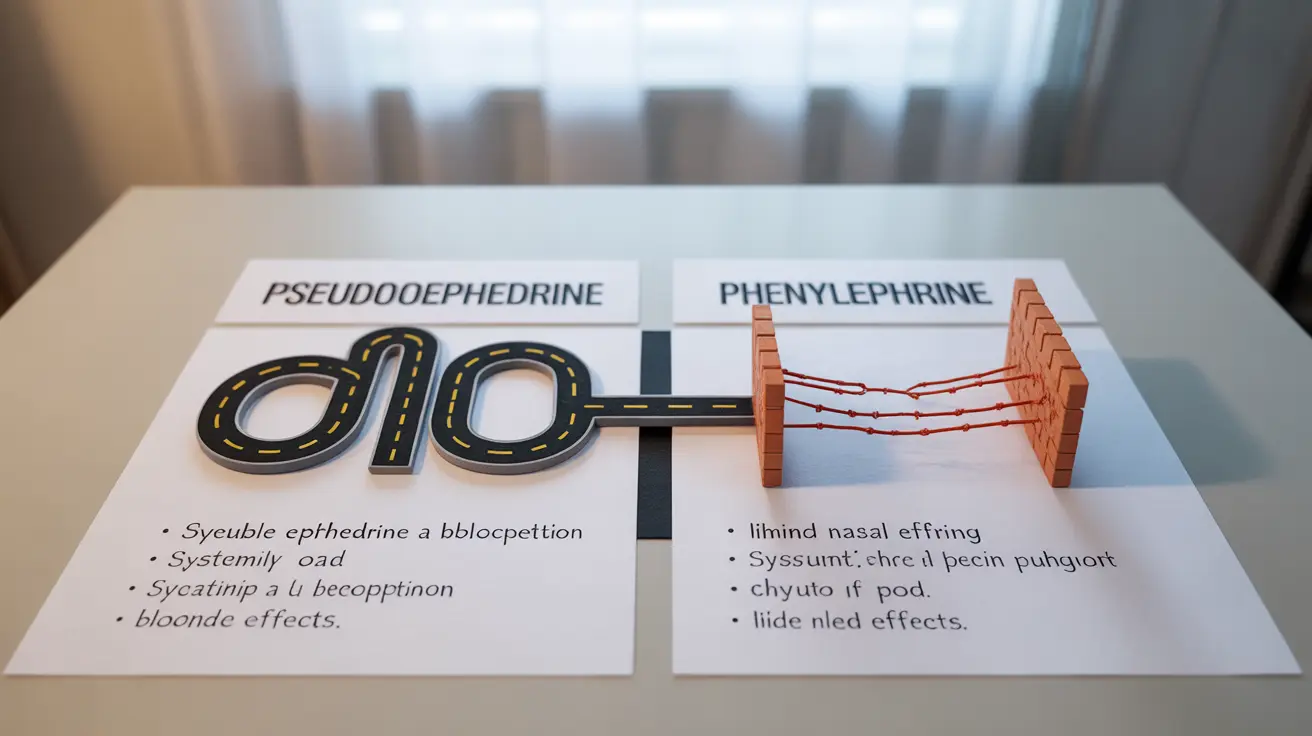When you're dealing with nasal congestion, choosing the right decongestant can make a significant difference in your relief. Two common options, pseudoephedrine and phenylephrine, are available but work differently and come with distinct considerations. Understanding these differences is crucial for making an informed decision about your congestion treatment.
This comprehensive guide will explore the key differences between these decongestants, their effectiveness, availability, and safety profiles to help you make the best choice for your needs.
How These Decongestants Work
Pseudoephedrine and phenylephrine both act as decongestants, but their mechanisms of action and effectiveness differ significantly. Pseudoephedrine works by directly stimulating receptors that cause blood vessel constriction in the nasal passages, effectively reducing swelling and congestion. In contrast, phenylephrine works through a similar mechanism but has different chemical properties that affect how well it's absorbed by the body.
Effectiveness Comparison
Clinical Evidence
Research has consistently shown that pseudoephedrine demonstrates superior effectiveness in relieving nasal congestion compared to phenylephrine. Studies indicate that oral phenylephrine may not be significantly more effective than a placebo in many cases, while pseudoephedrine has proven more reliable in providing noticeable congestion relief.
Duration of Action
Pseudoephedrine typically provides longer-lasting relief, with effects that can last 4-6 hours for immediate-release formulations and up to 12-24 hours for extended-release versions. Phenylephrine's effects tend to be shorter-lasting, often requiring more frequent dosing.
Availability and Regulations
The availability of these medications differs significantly due to regulatory requirements. Pseudoephedrine is kept behind the pharmacy counter and requires ID for purchase due to its potential use in manufacturing illegal substances. Phenylephrine is available over-the-counter without restrictions, making it more readily accessible to consumers.
Safety Considerations and Side Effects
Pseudoephedrine Considerations
Common side effects of pseudoephedrine can include:
- Increased heart rate
- Elevated blood pressure
- Insomnia
- Anxiety
- Restlessness
Phenylephrine Considerations
Phenylephrine typically has milder side effects, which may include:
- Mild elevation in blood pressure
- Headache
- Dizziness
- Nervousness
Making the Right Choice
When selecting between these decongestants, consider:
- Your medical history and current health conditions
- Other medications you're taking
- The severity of your congestion
- How quickly you need relief
- Your sensitivity to stimulants
Frequently Asked Questions
Q: What is the difference in effectiveness between pseudoephedrine and phenylephrine for relieving nasal congestion?
A: Pseudoephedrine is generally more effective at relieving nasal congestion than phenylephrine. Clinical studies have shown that pseudoephedrine provides more reliable and longer-lasting congestion relief, while phenylephrine's effectiveness may be comparable to placebo in some cases.
Q: Why is pseudoephedrine more regulated than phenylephrine, and how does this affect availability?
A: Pseudoephedrine is more strictly regulated because it can be used to manufacture methamphetamine. As a result, it's kept behind the pharmacy counter and requires ID for purchase, while phenylephrine is freely available over-the-counter.
Q: What are the common side effects and safety concerns of taking pseudoephedrine versus phenylephrine?
A: Pseudoephedrine typically causes more pronounced side effects, including increased heart rate, elevated blood pressure, and insomnia. Phenylephrine generally has milder side effects, making it a potentially better choice for those sensitive to stimulants.
Q: Can phenylephrine be a good alternative to pseudoephedrine for people with high blood pressure or sensitivity to stimulants?
A: Yes, phenylephrine may be a better choice for people with high blood pressure or stimulant sensitivity because it typically has less impact on blood pressure and heart rate than pseudoephedrine, though you should always consult with a healthcare provider first.
Q: How should I choose between pseudoephedrine and phenylephrine for treating sinus or nasal congestion?
A: Consider factors such as your medical history, the severity of your symptoms, and your tolerance to stimulants. If you need stronger relief and don't have contraindications, pseudoephedrine may be more effective. If you're sensitive to stimulants or prefer easier access, phenylephrine might be more suitable.
Remember to always consult with a healthcare provider before starting any new medication, especially if you have underlying health conditions or take other medications.




